| Reviews & Columns |
|
Reviews DVD TV on DVD Blu-ray 4K UHD International DVDs In Theaters Reviews by Studio Video Games Features Collector Series DVDs Easter Egg Database Interviews DVD Talk Radio Feature Articles Columns Anime Talk DVD Savant Horror DVDs The M.O.D. Squad Art House HD Talk Silent DVD
|
DVD Talk Forum |
|
|
| Resources |
|
DVD Price Search Customer Service #'s RCE Info Links |
|
Columns
|
|
|
Paradise: Love
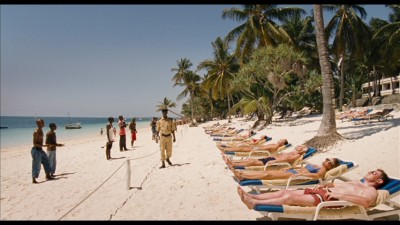
Teresa (the captivating, fearless Margarete Tiesel) is an overweight, middle-aged Middle-European divorcée with job duties, a home to keep, and a sullen teenage daughter -- the of busy but lonely middle-class woman who's watched too much of life pass her by when it hasn't actively been treating her badly. She is, in short, the kind of character the Lifetime Channel or Cougar Town or The First Wives' Club might hone in on as ripe for "empowerment," someone who will finally learn to treat herself well and perhaps treat herself to a sensitive, beautiful younger man who sees and loves her for what she is. But, as that "empowerment" narrative transpires in Ulrich Seidl's Paradise: Love, there's some vital piece of the puzzle missing, some important observations and understandings neglected, that cause our heroine to suffer in ways that go well beyond the grinding humdrum of her quotidian, drudging life in a nondescript lower-middle-class section of Vienna, and to cause others to suffer too, all inadvertently, because she is blissfully unaware -- a state of being that, in Seidl's world, is as widespread as it is wincingly consequential. If Eat, Pray, Love offered up a willfully myopic fantasy about a very special, very deep, yearning-filled Western white lady blithely getting the most from her privileged customer's position in an "exotic," "spiritual," impoverished foreign place, Seidl's film proposes a scenario of what it might look like if an ordinary, even typical woman tried to emulate that kind of journey of self-discovery. This means that Seidl takes a much longer view of Teresa and her search for fulfillment, encompassing in his wider perspective some unavoidable, if oft-overlooked factors -- economics, social conditions, cultural misunderstandings, and baseline affluent-Westerner ignorance/arrogance -- that tend to disempower and only stand in the way of genuine fulfillment or liberation, so that watching Teresa's escapist struggle against the boredom of her prosaic, materially comfortable, vaguely disappointing life is like witnessing the kind of blind, futile thrashing that only makes an unyielding net or trap ensnare its victim even more tightly.
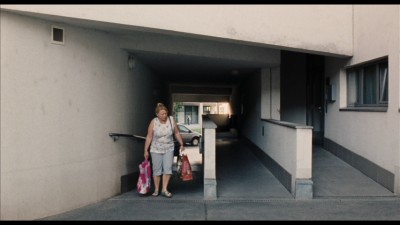
As in the greatest films of Seidl's forebear, his fellow unfailingly critical Germanic director R.W. Fassbinder (Fox and his Friends, In a Year of 13 Moons), Seidl doesn't skimp on the (melo)dramatic bait that gets us wrapped up in Teresa's individual ill-fated quest, even as it points to some decisive factors of which the individual herself is barely aware. Teresa's life story, her concerns, her problems, are interesting, relatable; she may be hapless, naïve, and ignorant, but she's earnest and sweet, too, and she can hardly be said to mean anyone any harm. And if Seidl initially seems to be too easily or lazily indulging in mockery of her corpulent, affably insecure, bright-eyed-and-bushy-tailed tourist's persona as she eagerly leaves gray-skied, institutional Vienna behind for her long-anticipated package trip to a cordoned-off Kenyan resort, he never lets us entirely forget that Teresa -- however much suffering she ends up inadvertently contributing to in her role as an economically necessary but despised well-off European interloper -- suffers in ways that are real to her, too. By the end of her story -- less a conclusion than an impasse at which we can't be certain whether Teresa has experienced any realization, or whether one woman's realization could ever mean much in the seemingly inexorable way people's lives are ordered -- she's fallen in love with a much younger Kenyan man, the convincingly solicitous and tender Munga (Peter Kazungu), and when that delusion has been cruelly exposed, she's fallen in with a group of jaded, seasoned fellow Austrian ladies who know and accept the terms of the "sex-tourist" game, and begins a cynical, humiliating cycle of relations with some of the other young, available African men to be found. But exploiting the real material desperation of these men, even under the hot, "romantic" Kenyan sun, with the intention of filling up the empty spot left by the cool, impersonal order and duties of home, proves not so very different from the inevitably unsatisfying consumer comforts/drudgery for which it's supposed to be a cure.

Nor are these women, in their banal, dutifully acquisitive pleasure-seeking, so very different from the group of another kind of "tourist" -- Down syndrome sufferers taken by Teresa, apparently their carer as her vocation, on a field trip to an amusement center on the outskirts of Vienna -- with whose exploits Seidl strikingly opens the film. This opening salvo/comment encapsulates what could seem at first problematic (is Seidl indulging in cheap exploitation of Teresa's cognitively impaired charges as they wail and scream in their bumper cars, terrified and/or overstimulated on the ill-advised ride? Does he mean the implicit equivalency between this turbulent, commercialized escapism and that undertaken by Teresa on her trip to Kenya as an offensive insult, likening her to a "retarded" person?) about the film: We're not quite sure how to respond, how to take what we're being shown. But Seidl is recruiting that uncomfortable tension for higher purposes, and in the end, he attains a panoramic enough view that it becomes clear that it's not the unwilling, unprepared, special-needs bumper-car riders, or the hapless Teresa, or the necessarily opportunistic Kenyans who are the objects of the author's scathing critique, mockery, and melancholy disillusion and pessimism. It is instead the invisible but omnipresent power of their circumstances, of their societies, of our pathologically disordered world and its insidious patterns over these individuals, all just weak human beings with unmet needs whom circumstance (and how did these circumstances arise, and why should things be this way, that is the important question) has led to prey, unconsciously, unquestioningly, upon each other.
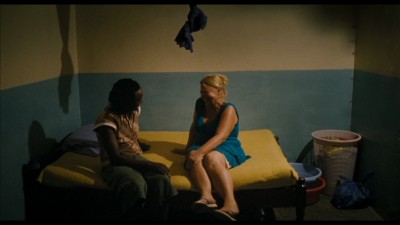
Seidl's visual approach -- facilitated nicely here by the strong, prettily variegated, but usually naturalistic-feeling lighting of his two DPs, longtime Seidl collaborator Wolfgang Thaler and the American cinematographer Ed Lachman, best known for his collaborations with Todd Haynes (Far from Heaven, I'm Not There, Mildred Pierce) -- is somewhat reminiscent of that of his similarly-minded contemporary, Michael Haneke (Code Unknown), and instrumental in enlarging the film's scope far beyond mere cheap shots or scapegoating: There's a clear, calm, restrained, but extremely precise and diligent quality to the framings and the mise-en-scène, and a willingness to let moments play out slowly but with immediate realism, so that we have both the full picture -- the characters in their environments, the quasi-segregated beaches, the clinically clean resort lodgings with their odd resemblance to Teresa's own anonymous Vienna apartment block, the poor, hot, brightly painted local rooms where her trysts play out in all their awkwardness, self-conscious horror, and sadness -- and the living through, the life-texture, of these "normal," frequently awful interactions/transactions between the characters. It's bracing, harrowing, relentlessly critical stuff: Those so inclined are sure to dismiss Seidl, as they've dismissed Fassbinder and Haneke before him, as a fashionable pessimist, a wallower, and a sadist. But in so skillfully showing us more of the picture, more of the story than perhaps flatters us or the characters, or is easy to swallow, Seidl creates an experience that marks you, stretches your perceptions, broadens your understanding of the complex, clashing intricacies of power that shape human life. It hardly leaves you with decisive diagnoses or prescriptions for the problems it astutely and rigorously delineates in involved, minute detail, but it does leave you deeply, bracingly aware of its people's imposed, entrenched, unchallenged patterns. It's a film whose very clear intent to provoke seems questionable at first, but by the time it's over, is genuine seriousness and effectiveness are undeniable.
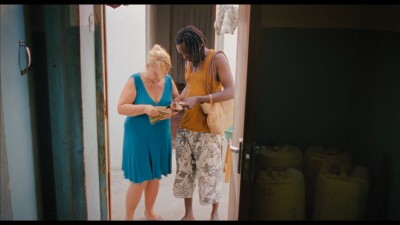
Love is only the first part of a "Paradise" trilogy, already shot in its entirety and ready for release, that will also see Seidl covering, through the stories of other members of Teresa's family (whom we glimpse together briefly near the beginning of this film), other proposed escape routes from coddled but soulless contemporary Western life, Faith and Hope. This very successful first installment whets one's appetite for seeing just how expansively Seidl will have probed, critiqued, and questioned our most vaunted and cherished heavens by the time the last panel of this intriguing, unsparing triptych has been mounted into place.
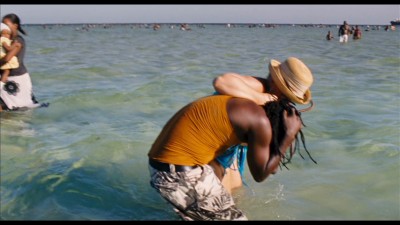
Strand Releasing has only provided a DVD-R copy of the retail disc for review, but even judging from that additional picture-quality distance, the transfer and sound (Dolby Digital 5.1 surround, in German with English subtitles, most likely to be non-optional) are at least decent, with no egregious compression artifacts (very little edge enhancement) and some nice retention of celluloid-like texture/no digital over-smoothing, and good, clear, rich, full surround sound with no distortions or imbalance.

Unnervingly straddling the borders dividing critique, compassion, and satirical near-contempt (borders it's aesthetically committed to proving mutable or false), Ulrich Seidl's Paradise: Love is the first part of a trilogy about three related Austrian women who are on quixotic bourgeois-European quests for their own versions of heaven on earth. This one starts it off with a bang: When Teresa, a middle-aged, middle-class European lady, sets off on her package vacation and lands in the glorious tropical "paradise" of…coastal Kenya, her dealings with the "natives" take a turn from annoyance at their friendly, incessant peddling to infatuation with what seems to be one young man's sincerely tender feeling towards her. A group of more seasoned fellow female European visitors -- more openly "sex tourists" who seem to know the rules of this game -- is there to rally round and enfold her when she realizes her actual position, her inescapable customer's role in this "paradise," and that's what Paradise: Love is about: The simple needs of regular people horrendously thwarted and warped by the false but very well-enforced identities of tourist/native, European/African, into which they so easily, so "naturally" fall, shaped as they are by economics, politics, and cultural and societal policies and norms. Like his forebear R.W. Fassbinder (Ali: Fear Eats the Soul) or his contemporary Michael Haneke (71 Fragments of a Chronology of Chance), Seidl is impassioned by, obsessed with showing us this strange world of ours with its skewed but well-accepted power relations in a way that provokes us to ponder what makes it tick (and to consider our own roles, too), and the picture they show us, however fascinating, is not at all pretty or comforting. Seidl, perhaps, brandishes his harsh but undeniable snapshot at us with a little too much glee at times, but that's only the surface of his very fine film: He's in it for the long haul, and he sticks with Teresa's journey and all its implications right to the bitter-stalemate end, and ultimately, the film succeeds -- through narrative, philosophical, and aesthetic pistons firing in wonderful tandem under Seidl's quite masterful engineering -- in making its point resonate deeply, indelibly: Leaving aside whether characters are "good" or "bad" individuals, one person's emotion and pleasure are always someone else's strictly-business concern, and any line distinguishing heaven, or "paradise," from the other place is both very fine indeed and infinitely tricky to negotiate. Highly Recommended.
|
| Popular Reviews |
| Sponsored Links |
|
|
| Sponsored Links |
|
|
| Release List | Reviews | Shop | Newsletter | Forum | DVD Giveaways | Blu-Ray | Advertise |
|
Copyright 2024 DVDTalk.com All Rights Reserved. Legal Info, Privacy Policy, Terms of Use,
Manage Preferences,
Your Privacy Choices | |||||||













